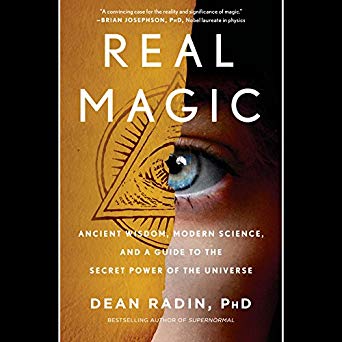
Imagine being Hermione Granger, or Harry Potter or even Merlin from King Arthur’s court, now throw all that out of the window, it isn’t like that at all. Humans really don’t have a huge effect on reality, which is good if you think about it. For instance, you wouldn’t want to be turned into a ferret because you mouthed off at the wrong magician. Doing real magic takes a great deal of effort and practice at being brainless. It turns out that our brains tend to interfere with our ‘minds’ which are the conduits to the data stream that gives us magical ability. Most of us wouldn’t be very good at it even if we spent a lot of time meditating while firmly grasping a crystal shard. Just like any other skill, it’s a combination of genes, talent, and practice. That’s the bad news.
The good news is that we do have a measurable effect on our reality, albeit a small one. Experiments done for over a century have shown that intention and attention can somehow manipulate the probabilities to our favor if we spend time dwelling on it. Our ancestors knew this quite well though it freaked out people in positions of power. Nostradamus, the famous precog, hid his ability from the Catholic church which was really quick to toss people like him into a fire or drown them for their own good. Not all psychically skilled people feared for their lives. The Oracle of Delphi was a highly regarded figure in antiquity providing useful information to seekers. Shaman or healers in small communities helped their people find food, avoid danger and healed them of their infirmities. Psychic mediums provided solace to grieving mothers and widows after the Civil War. Remote Viewers sought information about Soviet maneuvers during the Cold War. Police have found missing persons or solved crimes using information gleaned from the psychic realm.
Real magic can be classified into three different aspects: divination, force-of-will, and theurgy which have been reclassified using modern terminology. To divine information is to pull it out of the air so-to-speak which parapsychologists call Telepathy, Clairvoyance, Remote Viewing, Precognition, etcetera (please refer to my posts on each of these subjects). Anyone who reads tea leaves, Tarot cards or palms of hands are also classified as diviners. Theurgy is the utilization of spirit entities for information which includes but is not limited to spiritual mediumship and shamanism. Force-of-will can be classified as psychokinesis which is a big word for manipulating things without physically touching them. New Thought may also fall under this classification because you can manipulate your own fate.
Much of the book “Real Magic” is filled with experiments that prove that we can manipulate reality and even see probable futures. This throws those who believe in the mechanistic dogma for a loop. According to mainstream science (e.g. classical physicists) magical ability is impossible. Ask a Quantum mechanic and they’ll say they aren’t sure what’s making this car run but they CAN see that causality and time don’t really work the same in the subatomic world as it does in the visible one. Psychologists and Neurobiologists are still holding fast to the belief that the brain creates our self-awareness but cannot find where it is happening. Materialism is hitting a wall so in comes Idealism. Where Materialism sees self-awareness as a manifestation of the brain, Idealism says that self-awareness, or Consciousness, is a fundamental part of reality that sits below physics, chemistry, biology and all that we know of reality. This subatomic realm may not just be a data field but part and parcel of who we are.
I recommend this book as a primer for those interested in the field of parapsychology and for those whose minds just can’t quite wrap themselves around the concept of psychic ability. It is a comprehensive, comprehensible and at times comical look at supernatural abilities but also a treatise on how parapsychology has been ignored at best and demonized at worst. It argues quite eloquently for the existence of the magical but does not apologize for the century of strict laboratory experimentation on the subject. If you want to learn how to become a wizard, play an online game instead… this is not the book for you.
